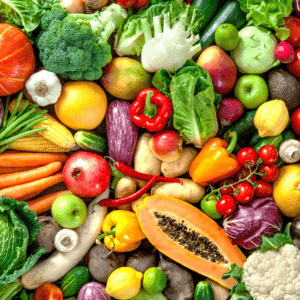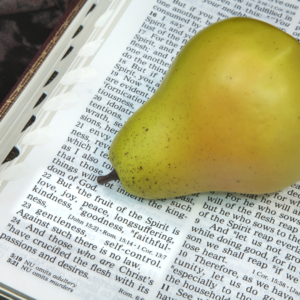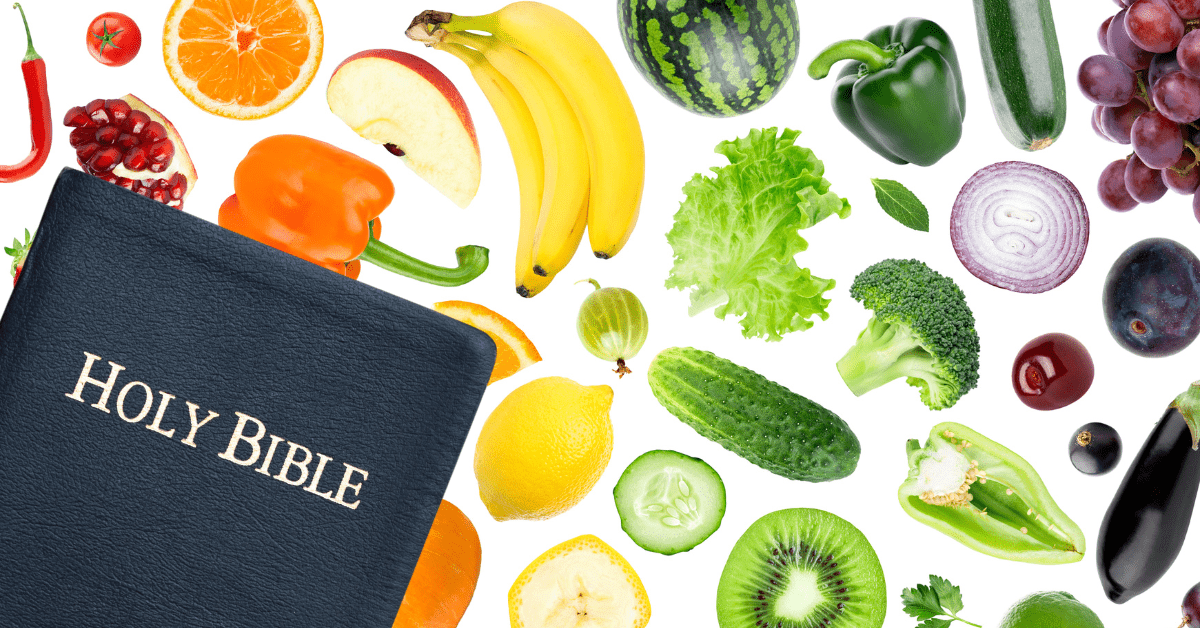God made seed-bearing plants in the beginning and gave them to humanity as food and sustenance. The seed-bearing plants offer a rich source of vital nutrients that promote our general health and well-being, ranging from fruits and vegetables to beans, nuts, and seeds. Let’s examine the significance of seed-bearing plants in the Bible as well as their function in fostering health and vitality. We will explore the significance of Genesis 1:29 and talk about the numerous kinds of plants that produce seeds that are mentioned in both the Old and New Testaments. We will also look at the advantages of having seed-bearing plants in our daily diet, such as their potential to increase immunity, strengthen the heart, encourage weight loss, and support good skin.
Seed-Bearing Plants in the Bible

Plants that produce seeds are important both in the Bible and in everyday life. Every seed that a plant produces and every seed that a tree produces, according to Genesis 1:29, is intended for human use. This comprises of foods like fruits, vegetables, beans, nuts, and seeds that give our bodies the vital elements they need. Plants that produce seeds were employed for food, medicine, and religious rituals in the Old Testament. The New Testament made use of agricultural allegories and analogies to communicate spiritual lessons.
The numerous kinds of seed-bearing plants, their practical use, and their spiritual importance will all be covered. Let’s explore the glories of God’s creation together as we delve more into the world of seed-bearing plants.
What are Seed-Bearing Plants?

As they contain a vast range of fruits, vegetables, beans, nuts, and seeds that offer vital nutrients and nutrition for our bodies, seed-bearing plants are a crucial component of our daily diet. The two main classifications of these plants are angiosperms (flowering plants) and gymnosperms (non-flowering plants), which reproduce by seeds. Gymnosperms have exposed seeds without a protective fruit layer, whereas angiosperms have their seeds enclosed within a fruit.
Plants that produce seeds are an essential source of food, medicine, and other goods. Among the many fruits described in the Bible that are still widely consumed today are apples, dates, figs, grapes, olives, pomegranates, and raisins. The Bible also makes reference to a variety of vegetables, many of which are still crucial sources of nutrition in today’s society. Examples include lentils, cucumbers, garlic, leeks, and onions. Additionally, nuts like almonds, pistachios, and walnuts as well as beans like chickpeas and lentils are important sources of protein and good fats. Additionally, seeds like sesame, coriander, cumin, flax, and mustard are used to season food and give it taste.
Seed-bearing plants have significance in the Bible that extends beyond only their utilitarian uses. They have spiritual meaning as well. According to Genesis 1:29, God created all seed-bearing plants and fruit-bearing trees specifically for human sustenance. This stanza emphasizes the value of seed-bearing plants and their contribution to human sustenance and nutrition.
Genesis 1:29 Explained

Genesis 1:29 places emphasis on God’s provision of plants and trees that produce fruits and seeds for human use. or nourishment.
Then God said, “I give you every seed-bearing plant on the face of the whole earth and every tree that has fruit with seed in it. They will be yours for food. Genesis 1:29
This stanza emphasizes the value of seed-bearing plants and their contribution to human sustenance and nutrition. God’s kindness and concern for His creation are further highlighted by the multitude of resources He supplies for our use and enjoyment.
Additionally, this passage implies that it is our duty as humans to take good care of the earth’s resources and manage them in a sustainable manner. We have a responsibility to use the earth’s resources responsibly and in a way that is good for the environment as well as for ourselves.
The Bible scripture Genesis 1:29 emphasizes the significance of seed-bearing plants and their function in supplying nourishment for people. Additionally, it highlights our duty to take good care of and sustainably manage the earth’s resources.
Old Testament

The Old Testament places a great deal of emphasis on seed-bearing plants since they were frequently employed for a variety of functions, including food, medicine, and religious rituals.
God commands the Israelites in Leviticus 27:30 to tithe all of the land’s produce, including seed-bearing plants: “And all the tithe of the land, whether of the seed of the land or of the fruit of the tree, is the Lord’s. It is holy to the Lord.” This verse emphasizes the value of seed-bearing plants and the need to thank God for the abundance of resources He has given to us.
Furthermore, the Old Testament makes specific seed-bearing plants, such grapes, wheat, and barley, known in a number of lines.
For the Lord your God is bringing you into a good land—a land with brooks, streams, and deep springs gushing out into the valleys and hills; 8 a land with wheat and barley, vines and fig trees, pomegranates, olive oil and honey; 9 a land where bread will not be scarce and you will lack nothing; a land where the rocks are iron and you can dig copper out of the hills. Deuteronomy 8:8
When they reached the Valley of Eshkol, they cut off a branch bearing a single cluster of grapes. Two of them carried it on a pole between them, along with some pomegranates and figs. Numbers 13:23.
These lines highlight the importance of seed-bearing plants to people in the Old Testament era in their daily lives. They were essential to their cultural and religious traditions in addition to serving as a source of food.
New Testament

Although seed-bearing plants are not specifically mentioned in the New Testament, it does make use of agricultural imagery and metaphors to communicate spiritual lessons. Jesus compares the dissemination of the gospel to planting seeds in various types of soil in the parable of the sower (Matthew 13:3–9; Mark 4:3–9; Luke 8:4–8). In this parable, the seed stands in for the word of God, which, when received with an open mind and a pure heart, can grow and produce fruit in the minds of those who do.
The apostle Paul explains the idea of resurrection in 1 Corinthians 15:36–38 by comparing planting and harvesting to life and death: “What you sow does not come to life unless it dies. And what you sow is not the body that is to be, but a bare kernel, perhaps of wheat or of some other grain. But God gives it a body as he has chosen, and to each kind of seed its own body.”
Paul emphasizes that our physical bodies must experience death and decay in order to be changed into an imperishable and everlasting form, just as a seed must perish and be buried in the earth to generate new life.
These illustrations demonstrate how the New Testament figuratively conveys spiritual lessons and ideas through the use of seed-bearing plants and farming methods. Even while they might not directly relate to the purposes of plants that produce seeds, they serve as a reminder of how intertwined the material and spiritual facets of our world are.
Fruit of the Spirit

The Bible mentions the fruit of the Spirit together with the physical advantages of eating seed-bearing plants.
But the fruit of the Spirit is love, joy, peace, forbearance, kindness, goodness, faithfulness, gentleness and self-control. Against such things there is no law. Galatians 5:22-23
These fruits, which are necessary for leading a life of meaning, purpose, and fulfillment, stand in for the virtues that God wants to instill in us.
The fruits of the Spirit nourish our souls and advance spiritual health and well-being, just as seed-bearing plants nourish our bodies. Love, joy, peace, patience, kindness, goodness, faithfulness, gentleness, and self-control are virtues that we can cultivate in our life to enhance our connections with others, deepen our relationship with God, and experience higher levels of fulfillment, contentment, and joy.
It’s crucial to remember that growing the fruit of the Spirit needs discipline, practice, and persistence and is not always simple. However, we may progressively cultivate these fruits within us and observe the beneficial effects they have on our lives as well as the lives of people around us by embracing daily rituals like prayer, meditation, and deeds of kindness.
Cultivating the fruits of the Spirit is essential if we want to feed our souls in the same way that we feed our bodies with plants that produce seeds. We can live a life of purpose, meaning, and fulfillment by cultivating love, joy, peace, patience, kindness, goodness, faithfulness, gentleness, and self-control. We can also be a positive force for good in the world.
All Seed Bearing Plants in the Bible
Numerous foods that were popular at the time the Bible was written, including fruits, vegetables, beans, nuts, and seeds, are mentioned in it. Some of the plants mentioned in the Bible are listed below:
Fruits:
Apples (Song of Solomon 2:5)
Dates (2 Samuel 6:19, Ezekiel 34:13)
Figs (Isaiah 34:4, Jeremiah 24:1-3)
Grapes (Genesis 49:11, Deuteronomy 32:14, Jeremiah 31:5)
Olives (Deuteronomy 8:8, Romans 11:17-24)
Pomegranates (Exodus 28:33-34, Song of Solomon 4:13)
Raisins (Numbers 6:3, 1 Samuel 25:18)
Vegetables:
Cucumbers (Numbers 11:5)
Garlic (Numbers 11:5)
Leeks (Numbers 11:5)
Onions (Numbers 11:5)
Lentils (Genesis 25:34, 2 Samuel 17:28)
Melons (Numbers 11:5)
Mustard (Matthew 13:31-32)
Beans:
Chickpeas (2 Samuel 17:28)
Lentils (Genesis 25:34, 2 Samuel 17:28)

Nuts:
Almonds (Genesis 43:11, Numbers 17:8)
Pistachios (Genesis 43:11)
Walnuts (Song of Solomon 6:11)
Seeds:
Coriander (Exodus 16:31, Numbers 11:7)
Cumin (Isaiah 28:25-27)
Flax (Isaiah 42:3)
Mustard (Matthew 13:31-32)
Sesame (Ezekiel 31:8)
The range of plants described in the Bible that were consumed during that time is illustrated by this list, which is not all-inclusive. In the contemporary world, these plants are still significant sources of food and nourishment, and eating them is advised to maintain a balanced diet.
Health Benefits of Seed-Bearing Plants

Plants that produce seeds are an essential source of nutrition and have numerous health advantages. Here are a few advantages that seed-bearing plants have for your health:
Rich in Nutrients
Plants that produce seeds are full of vital nutrients including vitamins, minerals, and antioxidants that are needed to sustain excellent health. We may make sure we are getting a variety of important nutrients each day by including a variety of fruits, vegetables, beans, nuts, and seeds in our diet.
Promotes Digestive Health
The high fiber content of many seed-bearing plants can aid in the promotion of digestive health by controlling bowel movements and reducing constipation. By encouraging the development of good gut bacteria, a healthy digestive system can also aid strengthen immunity.
Weight Loss
Generally low in calories and high in fiber, seed-bearing plants can aid in promoting fullness and preventing overeating. This can assist maintain a healthy weight. A variety of fruits, vegetables, beans, nuts, and seeds can help us maintain a healthy weight and lower our chance of developing disorders linked to obesity.
Reduces the Risk of Chronic Diseases
Antioxidants, which are abundant in seed-bearing plants, can help to fight inflammation and fend against the development of chronic illnesses including cancer, heart disease, and diabetes.
Promotes Skin Health
Plants that produce seeds are abundant in vitamins and antioxidants, which can aid in promoting healthy skin by lowering the danger of free radical skin damage. We can support the maintenance of healthy skin and delay premature aging by consuming a variety of seed-bearing plants.
A balanced diet must include seed-bearing plants since they have several health advantages, such as boosting skin health, weight maintenance, lowering the risk of chronic diseases, and digestive health. We can make sure we are getting a wide variety of critical nutrients and supporting overall health and wellbeing by including a variety of fruits, vegetables, beans, nuts, and seeds in our daily diet.
Seed-Bearing Plants for Weight Loss

It can be advantageous for weight loss to include a range of seed-bearing plants in our daily diet, such as fruits, vegetables, beans, nuts, and seeds. Here are a few illustrations of plants that produce seeds and can aid in weight loss:
- Fruits and vegetables: high in fiber and low in calories, which can help induce satiety and curb overeating. Additionally, they include a lot of vital vitamins and minerals that promote general health and wellbeing.
- Beans: great source of fiber and protein, which can help increase satiety and discourage binge eating. Beans’ fiber content can also help control blood sugar levels, reducing insulin spikes that might otherwise result in weight gain.
- Nuts and Seeds: lots of fiber, protein, and healthy fats, which can help people feel full and keep them from overeating. Consumed in moderation as they are heavy in calories.
- Quinoa: high protein grain and a lot of fiber, both of which can help with satiety and curb overeating. It also contains a lot of iron, which can help boost energy and avoid exhaustion.
By supplying necessary nutrients, encouraging satiety, and reducing overeating, including these seed-bearing plants in our diet regularly can aid in weight loss. To create a balanced diet, it’s crucial to consume them in moderation and to balance them with other critical elements.
Should Christians Be Vegans? Vegetarians?

Depending on one’s personal convictions and understanding of biblical teachings, Christians may or may not be vegans or vegetarians. The Bible does not specifically forbid eating meat, but it does stress the value of plant-based foods and their function in sustaining and nourishing people.
For ethical, medical, or environmental reasons, some Christians opt to eat vegetarianism or veganism. A vegetarian or vegan diet forgoes all animal products, including dairy, eggs, and honey, whereas a vegetarian or vegan diet forgoes all meat, fowl, and fish.
Other types of vegetarianism include pescetarianism, which includes fish in addition to plant-based foods, and lacto-ovo-vegetarianism, which includes dairy and eggs in the diet.
Vegetarianism and veganism are not required for Christians. After the flood, God give Noah a new dietary rule.
Everything that lives and moves about will be food for you. Just as I gave you the green plants, I now give you everything.Genesis 9:3,
This implying that humans are allowed to eat both plant-based and animal-based diets.
However, it is our duty as Christians to take good care of the earth’s resources and manage them in a sustainable manner. This involves eating meat in moderation and being aware of the origins and production processes of our food.
The Bible does not forbid eating meat, even though it highlights the value of plant-based diets. As Christians, we ought to make an effort to maintain a diet that is balanced and contains moderate amounts of fruits, vegetables, grains, legumes, and meats. The staple of our diets should be fruits and vegetables, which we should include with every meal. In the end, our food decisions should reflect our individual beliefs and values, while also taking into account how they will affect our health, the environment, and the welfare of all God’s creation.
Seed-Bearing Plants Conclusion
Since the dawn of time, people have relied on plants that produce seeds for food. The Bible emphasizes the significance of seed-bearing plants and their function in fostering health and vitality, as we have seen in this blog post. These plants, which range from fruits and vegetables to beans, nuts, and seeds, offer a wealth of vital nutrients that promote our general health and wellbeing. We may maintain good skin, strengthen our hearts, and promote immunity by including a range of seed-bearing plants in our diet on a daily basis. We can even help with weight loss.
Genesis 1:29’s significance extends beyond only advising readers on what to eat. It serves as a reminder of our duty to preserve and safeguard the natural world and the resources that God has endowed us with. We may foster a stronger spiritual connection and advance a more sustainable future for present and future generations by eating seed-bearing plants and being aware of our impact on the environment.
In addition to serving as a food source, plants that produce seeds serve as a constant reminder of the value of nature and our duty to preserve it. We may encourage physical, spiritual, and environmental health and wellbeing by including a diversity of seed-bearing plants in our diet and being aware of our impact on the environment.

